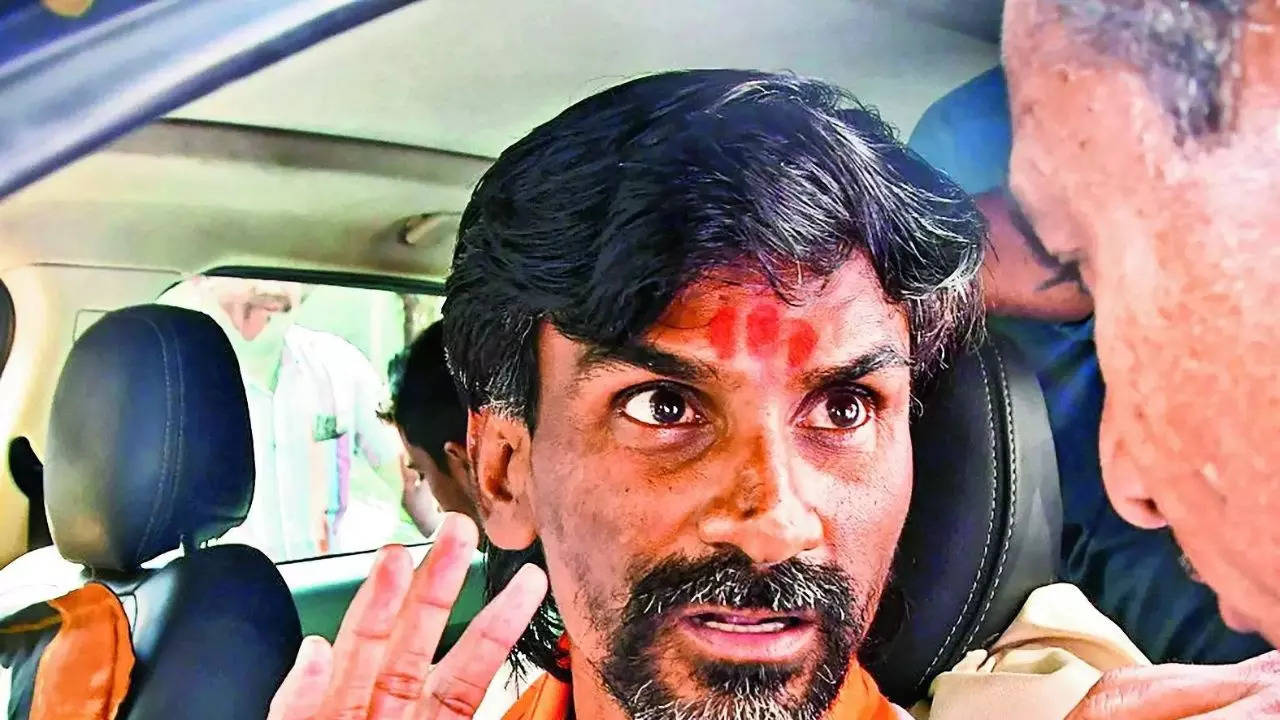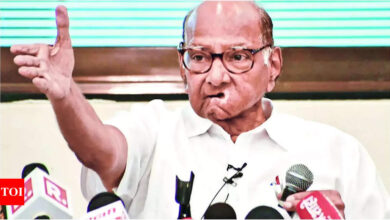India
Reservation: In quota stir, anger over political neglect unites Marathas despite economic divide | India News

[ad_1]
PUNE: The Eknath Shinde government in Maharashtra remains under intense pressure as the demand for reservation and a feeling of betrayal by the political leadership has united the Marathas, even across the gaping economic divide that exists in the community.
Marathas constitute roughly 33% of the state’s approximately 12 crore population. The community comprises several sub-groups, Kunbi-a predominantly farming community- among them.
The community has strong representation in politics.Many Marathas are sugar cooperative barons and run educational institutions. Of the 20 chief ministers since 1960 when the state was formed, at least 14 are from the community.
Despite the clout, there is a huge economic divide in the community. Tillers facing poor farm yields and droughts, like those from Marathwada, are vehement about reservation, and they form the backbone of the stir with their leaders demanding other backward class status along with a reservation.
Both protests started by activist Manoj Jarange in September and October were to demand Kunbi certificates for all Marathas, so that they can avail of reservation under the other backward classes (OBC) quota.
Why the insistence?
A survey, conducted by the state government on the community’s representation in government jobs, shows that the Maratha community has nearly 14% representation, but very little in Class-A jobs. In the police force too, though maximum posts are with the Maratha community, most are employed as lower ranked police personnel.
According to experts, the community has remained dependent on agriculture and, over the years, farming has shrunk and their economic situation has deteriorated. The Marathas blame the political leadership for not paying attention to the community’s upliftment.
Eminent writer Sadanand More told TOI there is disparity in the economic condition of people within the Maratha community. Some are super rich, but a vast majority is dependent on farming and has remained poor, he said.
“In the past, the community had large holdings but when the land was divided by families, it reduced the individual share. They need reservation to uplift themselves. The government should also focus on rejuvenation of the farming sector,” the writer added.
Anger against netas
The state’s politics has been dominated by leaders from their community, but Maratha activists are upset because irrespective of which party is in the driver’s seat, the leaders have not given back much to the community. It is the prime reason that close to 500 villages have banned the entry of any political leader.
Rajendra Kunjir, state coordinator of Maratha Kranti Morcha, told TOI that the community is increasingly feeling that they are being used by leaders for political gains.
He said, “In the last 40 years, no politician from the community has made efforts to resolve the quota issue. Even during the recent protest, they were unwilling to meet us to discuss the issue. That is when we started stopping them from entering our villages.”
Other community leaders said that the state government is trying to tide over matters till the elections are over.
“Lok Sabha and state assembly elections are a few months away and the government knows that there will be a huge backlash against them from the community. Therefore, it will keep this issue undecided till the elections are over,” Kunjir said.
Education for upliftment
Some experts said that the Maratha community should focus on skilled-based education for their own upliftment instead of waiting for reservation.
State president of Sambhaji Brigade, Pravin Gaikwad, told TOI that he has cautioned his community about falling prey to false promises made by political leaders.
“After privatisation of many sectors, government jobs have shrunk. Despite reservation, there won’t be enough jobs for them,” he said.
Gaikwad added that the community already has reservation under the economically weaker section.
“In Maharashtra, of the 10% EWS quota, nearly 8% goes to the Maratha community. There is already a reservation for Kunbis under OBC category. Other than these reservations, I really do not feel that the Maratha community will get reservations in any other form,” Gaikwad said, adding, “Therefore, the community should focus on getting better education to compete with the rest of the population in terms of education and jobs.”
Marathas constitute roughly 33% of the state’s approximately 12 crore population. The community comprises several sub-groups, Kunbi-a predominantly farming community- among them.
The community has strong representation in politics.Many Marathas are sugar cooperative barons and run educational institutions. Of the 20 chief ministers since 1960 when the state was formed, at least 14 are from the community.
Despite the clout, there is a huge economic divide in the community. Tillers facing poor farm yields and droughts, like those from Marathwada, are vehement about reservation, and they form the backbone of the stir with their leaders demanding other backward class status along with a reservation.
Both protests started by activist Manoj Jarange in September and October were to demand Kunbi certificates for all Marathas, so that they can avail of reservation under the other backward classes (OBC) quota.
Why the insistence?
A survey, conducted by the state government on the community’s representation in government jobs, shows that the Maratha community has nearly 14% representation, but very little in Class-A jobs. In the police force too, though maximum posts are with the Maratha community, most are employed as lower ranked police personnel.
According to experts, the community has remained dependent on agriculture and, over the years, farming has shrunk and their economic situation has deteriorated. The Marathas blame the political leadership for not paying attention to the community’s upliftment.
Eminent writer Sadanand More told TOI there is disparity in the economic condition of people within the Maratha community. Some are super rich, but a vast majority is dependent on farming and has remained poor, he said.
“In the past, the community had large holdings but when the land was divided by families, it reduced the individual share. They need reservation to uplift themselves. The government should also focus on rejuvenation of the farming sector,” the writer added.
Anger against netas
The state’s politics has been dominated by leaders from their community, but Maratha activists are upset because irrespective of which party is in the driver’s seat, the leaders have not given back much to the community. It is the prime reason that close to 500 villages have banned the entry of any political leader.
Rajendra Kunjir, state coordinator of Maratha Kranti Morcha, told TOI that the community is increasingly feeling that they are being used by leaders for political gains.
He said, “In the last 40 years, no politician from the community has made efforts to resolve the quota issue. Even during the recent protest, they were unwilling to meet us to discuss the issue. That is when we started stopping them from entering our villages.”
Other community leaders said that the state government is trying to tide over matters till the elections are over.
“Lok Sabha and state assembly elections are a few months away and the government knows that there will be a huge backlash against them from the community. Therefore, it will keep this issue undecided till the elections are over,” Kunjir said.
Education for upliftment
Some experts said that the Maratha community should focus on skilled-based education for their own upliftment instead of waiting for reservation.
State president of Sambhaji Brigade, Pravin Gaikwad, told TOI that he has cautioned his community about falling prey to false promises made by political leaders.
“After privatisation of many sectors, government jobs have shrunk. Despite reservation, there won’t be enough jobs for them,” he said.
Gaikwad added that the community already has reservation under the economically weaker section.
“In Maharashtra, of the 10% EWS quota, nearly 8% goes to the Maratha community. There is already a reservation for Kunbis under OBC category. Other than these reservations, I really do not feel that the Maratha community will get reservations in any other form,” Gaikwad said, adding, “Therefore, the community should focus on getting better education to compete with the rest of the population in terms of education and jobs.”
#Reservation #quota #stir #anger #political #neglect #unites #Marathas #economic #divide #India #News





